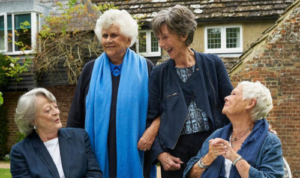Tea With the Dames
Posted on September 19, 2018 at 12:00 pm
A-| Lowest Recommended Age: | Middle School |
| MPAA Rating: | Not rated |
| Profanity: | Some strong and salty language |
| Alcohol/ Drugs: | Champagne |
| Violence/ Scariness: | None |
| Diversity Issues: | A theme of the movie (gender and aging) |
| Date Released to Theaters: | September 21, 2018 |

Dame Judi Dench, Dame Maggie Smith, Dame Joan Plowright, and Dame Eileen Atkins all came of age in the late 1950’s, beginning in theater and then movies and television. Director Roger Michell (“Notting Hill”) gives us a chance to eavesdrop on one of their get-togethers “to gossip, to remember, and to laugh.” They talk about acting, of course, but also about navigating show business and what they think of critics, and about husbands (everyone agrees that Dame Joan’s husband, Lord Oliver, was the most difficult), beauty, fear, competition, awards (we see each of them being Dame-d, by either Prince Charles or Queen Elizabeth II), Americans, Shakespeare, and aging, with the advice each of them would give their younger selves, though Dame Maggie (I would not dream of any other form of address, given the disdain they show for American clumsiness with titles) admits that her younger self would never have listened. And they do it all with such impeccable diction and classically trained technique in the exquisite timing of le mot plus juste.
In the early days, “you went to reps and you stayed in digs and things,” Dame Judi remembers. And if the landlady was unkind, “you nailed a kipper under the table.” Dame Joan Plowright talks about joining her first company, where another actor warned, “She can’t play queens, you know,” and the director replied, “I should think the last thing we want in a theater for contemporary writers is girls born to play queens.”
The Dames began acting as the “Kitchen Sink” era of postwar Britain was evolving into the swinging 60’s. There are some knowing looks and nostalgic smiles as they recall that era. There is a marvelous camaraderie and warm memories of working together that is unmarred by a continuing competition. Everyone remembers that Judi Dench was the first to be Dame-d. (When Dame Maggie got the word of her award, Dame Judi assured her that “It won’t change anything; you can still swear.) And the octogenarian Dame Maggie makes the kind of pointed comment that only the portrayer of the Dowager Duchess can master; her agent assures her that “We’ll look around for a nice little cameo that Judi does not have her paws on.”
Dame Eileen is less well known in the US, and I hope very much that this film and the marvelous archival clips will inspire American audiences to learn more about her. All of the Dames are exceptionally well represented with a remarkable range of clips, showing once again that one of the key differences between US and British actors is the British actors’ willingness to weigh in with equal enthusiasm to everything from classic dramas to avant garde to sitcoms. The glimpses of their work also provide a subtle but clear contrast between their delicious inability to take themselves seriously in real life and their obvious, visceral commitment to their performances, their characters, and the scripts and screenplays they bring to life.
None of them was willing to play Cleopatra (Shakespeare’s version), though all were asked repeatedly. Dame Judi challenged the director Peter Hall: “Do you really want a menopausal dwarf?” (But she did it.) Dame Maggie did it, but in Canada. But Cleopatra is a rare role that is the center of the play. Dame Joan describes “that rare exhilaration when you know you’re in charge.”
They talk about aging, and about fear, not of illness or death but, endearingly, enduringly, about the very thing they have devoted their lives to, acting. “Are first days still scary?” Michel asks, off camera. “All days,” Dame Maggie says immediately. But it is their relish for exactly that challenge that keeps them so vibrant. “Fear is petrol,” says Dame Judi. “It generates such an energy. If you can somehow handle it, it can be a help.”
As marvelous as they are playing other people, it is pure delight to see them as themselves.
Parents should know that the ladies use some frank and salty language and there are some sexual references.
Family discussion: What advice would you give to your younger self? Why didn’t they want to play Cleopatra?
If you like this, try: the films starring the Dames
